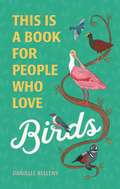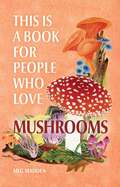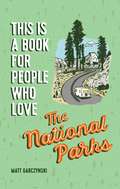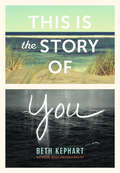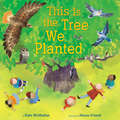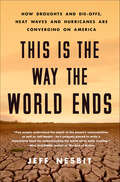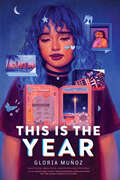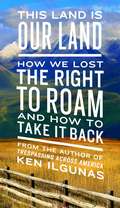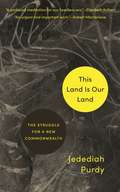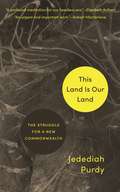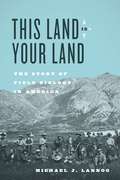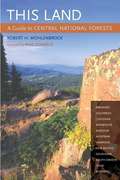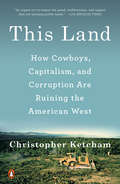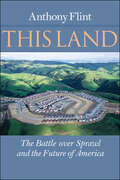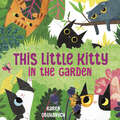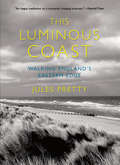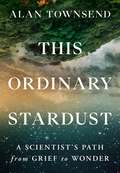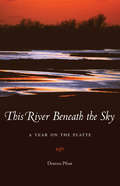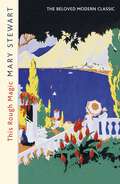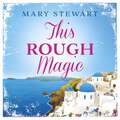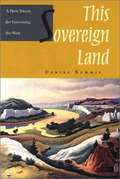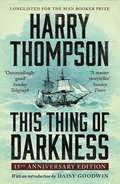- Table View
- List View
This Is a Book for People Who Love Birds (This Is a Book for People Who Love)
by Danielle BellenyFull of bird watching basics, fun facts, and illustrated species profiles, This Is a Book for People Who Love Birds is a joyful celebration of our feathered friends!For seasoned spotters and backyard hobbyists alike, this charming guide offers an accessible look at the irresistible world of birding. Wildlife biologist and co-founder of Black Birders Week Danielle Belleny walks readers through the essentials of bird watching, from equipment to locations, offering new ideas for finding avian friends wherever you may be. Engaging profiles of North American bird species, from cardinals and blue jays to raptors and sea birds, are accompanied by whimsical illustrations sure to spark the imaginations of birders from coast to coast. Deeply researched and accessible to enthusiasts of all levels of experience, This Is a Book for People Who Love Birds is an essential addition to every bird lover's field library.
This Is a Book for People Who Love Mushrooms (This Is a Book for People Who Love)
by Meg MaddenA celebratory compendium of nature's weirdest and most wonderful fungi, with gorgeously illustrated profiles of notable mushrooms and information on foraging, understanding, and appreciating these magnificent living thingsFor amateur mycologists and experienced foragers alike, this delightful guide acts as a welcome to the wonderful world of mushrooms. From the most common and recognizable varieties frequently found in your supermarket aisle or backyard to the rarest, most fantastical offerings that look straight out of a fairytale illustration and everything in between, This Is a Book for People Who Love Mushrooms is a carefully researched, whimsically illustrated primer on a subject that naturalists are discovering more about each year. Accessible to enthusiasts of all levels, it is the perfect gift for the mushroom lover in your life.
This Is a Book for People Who Love the National Parks
by Matt GarczynskiSmart, short, and irresistibly illustrated, This Is a Book for People Who Love National Parks is a park-by-park celebration of the American outdoors.For devoted park-goers and casual campers alike, this charming guide is nothing short of a celebration of America's natural wonders. An introduction to the storied history of the Parks Service is paired with engaging profiles of each of the sixty-one National Parks, from Acadia to Zion and everything in between. Quirky facts and key dates are woven throughout, while refreshingly modern illustrations capture the iconic features of each majestic setting. Deeply researched but not too serious, This Is a Book for People Who Love National Parks is an essential addition to every park lover's field library.
This Is the Story of You
by Beth KephartOn Haven, a six-mile long, half-mile-wide stretch of barrier island, Mira Banul and her Year-Rounder friends have proudly risen to every challenge. But then a superstorm defies all predictions and devastates the island, upending all logic and stranding Mira's mother and brother on the mainland. Nothing will ever be the same. A stranger appears in the wreck of Mira's home. A friend obsessed with vanishing disappears. As the mysteries deepen, Mira must find the strength to carry on—to somehow hold her memories in place while learning to trust a radically reinvented future. Gripping and poetic, This Is the Story of You is about the beauty of nature and the power of family, about finding hope in the wake of tragedy and recovery in the face of overwhelming loss.
This Is the Tree We Planted
by Kate McMullanLearn about all of the animals that coexist in just one tree that a classroom planted in this fun, informative, cumulative picture book in the tradition of This is the House That Jack Built.A class plants a tree in the playground, and together, they watch it grow. There is no shortage of action to observe in its branches: a robin protecting her eggs from a squirrel and her kits, a lizard stalking a spider, and a hawk swirling around overhead. Within this tree is an entire ecosystem, all created by the class who planted it. Beloved children's book creator Kate McMullan has crafted a story that will encourage kids to cultivate a love of nature as they observe the world living inside their backyards.
This Is the Way the World Ends: How Droughts and Die-Offs, Heat Waves and Hurricanes Are Converging on America
by Jeff NesbitBustle's "17 Best Nonfiction Books Coming Out In September 2018""With This is the Way the World Ends Jeff Nesbit has delivered an enlightening - and alarming - explanation of the climate challenge as it exists today. Climate change is no far-off threat. It's impacting communities all over the world at this very moment, and we ignore the scientific reality at our own peril. The good news? As Nesbit underscores, disaster is not preordained. The global community can meet this moment — and we must." —Senator John KerryA unique view of climate change glimpsed through the world's resources that are disappearing.The world itself won’t end, of course. Only ours will: our livelihoods, our homes, our cultures. And we’re squarely at the tipping point.Longer droughts in the Middle East. Growing desertification in China and Africa. The monsoon season shrinking in India. Amped-up heat waves in Australia. More intense hurricanes reaching America. Water wars in the Horn of Africa. Rebellions, refugees and starving children across the globe. These are not disconnected events. These are the pieces of a larger puzzle that environmental expert Jeff Nesbit puts together Unless we start addressing the causes of climate change and stop simply navigating its effects, we will be facing a series of unstoppable catastrophes by the time our preschoolers graduate from college. Our world is in trouble – right now. This Is the Way the World Ends tells the real stories of the substantial impacts to Earth’s systems unfolding across each continent. The bad news? Within two decades or so, our carbon budget will reach a point of no return. But there’s good news. Like every significant challenge we’ve faced—from creating civilization in the shadow of the last ice age to the Industrial Revolution—we can get out of this box canyon by understanding the realities and changing the worn-out climate conversation to one that’s relevant to every person. Nesbit provides a clear blueprint for real-time, workable solutions we can tackle together.
This Is the Year
by Gloria MuñozThis dazzling YA cli-fi written in prose and verse will speak to any reader struggling with the state of our world and how to understand their place in it."In outer space, no one will know me as the girl with the dead sister."Seventeen-year-old self-proclaimed Goth and aspiring writer Julieta Villarreal is drowning. She&’s grieving her twin sister who died in a hit-and-run, her Florida home is crumbling under the weight of climate disaster, and she isn&’t sure how much longer she can stand to stay in a place that doesn&’t seem to have room for her. Then, Juli is recruited by Cometa, a private space program enlisting high-aptitude New American teens for a high-stakes mission to establish humanity&’s first extraterrestrial settlement. Cometa pitches this as an opportunity for Juli to give back to her adopted country; Juli sees it as her only chance to do something big with her life. Juli begins her training, convinced Cometa is her path to freedom. But her senior year is full of surprises, including new friendships, roller skating, and first love. And through her small but poignant acts of environmentalism, Juli begins to find hope in unexpected places. As her world collapses from the ramifications of the climate crisis, Juli must decide if she&’ll carry her loss together with her community or leave it all behind.Told in gripping prose interspersed with poems from Juli&’s writing journal, this genre-bending novel explores themes of immigration, climate justice, grief, and the power of communities.
This Land Is Our Land: How We Lost the Right to Roam and How to Take It Back
by Ken IlgunasPrivate property is everywhere. Almost anywhere you walk in the United States, you will spot “No Trespassing” and “Private Property” signs on trees and fence posts. In America, there are more than a billion acres of grassland pasture, cropland, and forest, and miles and miles of coastlines that are mostly closed off to the public. Meanwhile, America’s public lands are threatened by extremist groups and right-wing think tanks who call for our public lands to be sold to the highest bidder and closed off to everyone else. If these groups get their way, public property may become private, precious green spaces may be developed, and the common good may be sacrificed for the benefit of the wealthy few.Ken Ilgunas, lifelong traveler, hitchhiker, and roamer, takes readers back to the nineteenth century, when Americans were allowed to journey undisturbed across the country. Today, though, America finds itself as an outlier in the Western world as a number of European countries have created sophisticated legal systems that protect landowners and give citizens generous roaming rights to their countries' green spaces. Inspired by the United States' history of roaming, and taking guidance from present-day Europe, Ilgunas calls into question our entrenched understanding of private property and provocatively proposes something unheard of: opening up American private property for public recreation. He imagines a future in which folks everywhere will have the right to walk safely, explore freely, and roam boldly—from California to the New York island, from the Redwood Forest to the Gulf Stream waters.
This Land Is Our Land: The Struggle for a New Commonwealth
by Jedediah PurdyFrom one of our finest writers and leading environmental thinkers, a powerful book about how the land we share divides us—and how it could unite usToday, we are at a turning point as we face ecological and political crises that are rooted in conflicts over the land itself. But these problems can be solved if we draw on elements of our tradition that move us toward a new commonwealth—a community founded on the well-being of all people and the natural world. In this brief, powerful, timely, and hopeful book, Jedediah Purdy, one of our finest writers and leading environmental thinkers, explores how we might begin to heal our fractured and contentious relationship with the land and with each other.From the coalfields of Appalachia and the tobacco fields of the Carolinas to the public lands of the West, Purdy shows how the land has always united and divided Americans, holding us in common projects and fates but also separating us into insiders and outsiders, owners and dependents, workers and bosses. Expropriated from Native Americans and transformed by slave labor, the same land that represents a history of racism and exploitation could, in the face of environmental catastrophe, bind us together in relationships of reciprocity and mutual responsibility.This may seem idealistic in our polarized time, but we are at a historical fork in the road, and if we do not make efforts now to move toward a commonwealth, Purdy warns, environmental and political pressures will create harsher and crueler conflicts—between citizens, between countries, and between humans and the rest of the world.
This Land Is Our Land: The Struggle for a New Commonwealth
by Jedediah PurdyFrom one of our finest writers and leading environmental thinkers, a powerful book about how the land we share divides us—and how it could unite usToday, we are at a turning point as we face ecological and political crises that are rooted in conflicts over the land itself. But these problems can be solved if we draw on elements of our tradition that move us toward a new commonwealth—a community founded on the well-being of all people and the natural world. In this brief, powerful, timely, and hopeful book, Jedediah Purdy explores how we might begin to heal our fractured and contentious relationship with the land and with each other.
This Land Is Your Land: The Story of Field Biology in America
by Michael J. LannooField biology is enjoying a resurgence due to several factors, the most important being the realization that there is no ecology, no conservation, and no ecosystem restoration without an understanding of the basic relationships between species and their environments—an understanding gleaned only through field-based natural history. With this resurgence, modern field biologists find themselves asking fundamental existential questions such as: Where did we come from? What is our story? Are we part of a larger legacy? In This Land Is Your Land, seasoned field biologist Michael J. Lannoo answers these questions and more in a tale rooted in the people and institutions of the Midwest. It is a story told from the ground up, a rubber boot–based natural history of field biology in America. Lannoo illuminates characters such as John Wesley Powell, William Temple Hornaday, and Olaus and Adolph Murie—homegrown midwestern field biologists who either headed east to populate major research centers or went west to conduct their fieldwork along the frontier. From the pioneering work of Victor Shelford, Henry Chandler Cowles, and Aldo Leopold to contemporary insights from biologists such as Jim Furnish and historians such as William Cronon, Lannoo’s unearthing of American—and particularly midwestern—field biologists reveals how these scientists influenced American ecology, conservation biology, and restoration ecology, and in turn drove global conservation efforts through environmental legislation and land set-asides. This Land Is Your Land reveals the little-known legacy of midwestern field biologists, whose ethos and discoveries have enabled us to preserve and understand not just their land, but all lands.
This Land: A Guide to Central National Forests
by Robert H. MohlenbrockA comprehensive guide to the facilities and natural features in the 43 national forests in Arkansas, Colorado, Louisiana, Minnesota, Missouri, Montana, Nebraska, New Mexico, Oklahoma, South Dakota, Texas, and Wyoming.
This Land: How Cowboys, Capitalism, and Corruption are Ruining the American West
by Christopher KetchamA hard-hitting look at the battle now raging over the fate of the public lands in the American West--and a plea for the protection of these last wild placesThe public lands of the western United States comprise some 450 million acres of grassland, steppe land, canyons, forests, and mountains. It's an American commons, and it is under assault as never before.Journalist Christopher Ketcham has been documenting the confluence of commercial exploitation and governmental misconduct in this region for over a decade. His revelatory book takes the reader on a journey across these last wild places, to see how capitalism is killing our great commons. Ketcham begins in Utah, revealing the environmental destruction caused by unregulated public lands livestock grazing, and exposing rampant malfeasance in the federal land management agencies, who have been compromised by the profit-driven livestock and energy interests they are supposed to regulate. He then turns to the broad effects of those corrupt politics on wildlife. He tracks the Department of Interior's failure to implement and enforce the Endangered Species Act--including its stark betrayal of protections for the grizzly bear and the sage grouse--and investigates the destructive behavior of U.S. Wildlife Services in their shocking mass slaughter of animals that threaten the livestock industry. Along the way, Ketcham talks with ecologists, biologists, botanists, former government employees, whistleblowers, grassroots environmentalists and other citizens who are fighting to protect the public domain for future generations. This Land is a colorful muckraking journey--part Edward Abbey, part Upton Sinclair--exposing the rot in American politics that is rapidly leading to the sell-out of our national heritage. The book ends with Ketcham's vision of ecological restoration for the American West: freeing the trampled, denuded ecosystems from the effects of grazing, enforcing the laws already in place to defend biodiversity, allowing the native species of the West to recover under a fully implemented Endangered Species Act, and establishing vast stretches of public land where there will be no development at all, not even for recreation.
This Land: The Battle over Sprawl and the Future of America
by Anthony FlintDespite a modest revival in city living, Americans are spreading out more than ever—into "exurbs" and "boomburbs" miles from anywhere, in big houses in big subdivisions. We cling to the notion of safer neighborhoods and better schools, but what we get, argues Anthony Flint, is long commutes, crushing gas prices and higher taxes—and a landscape of strip malls and office parks badly in need of a makeover.This Land tells the untold story of development in America—how the landscape is shaped by a furious clash of political, economic and cultural forces. It is the story of burgeoning anti-sprawl movement, a 1960s-style revolution of New Urbanism, smart growth, and green building. And it is the story of landowners fighting back on the basis of property rights, with free-market libertarians, homebuilders, road pavers, financial institutions, and even the lawn-care industry right alongside them.The subdivisions and extra-wide roadways are encroaching into the wetlands of Florida, ranchlands in Texas, and the desert outside Phoenix and Las Vegas. But with up to 120 million more people in the country by 2050, will the spread-out pattern cave in on itself? Could Americans embrace a new approach to development if it made sense for them?A veteran journalist who covered planning, development, and housing for the Boston Globe for sixteen years and a visiting scholar in 2005 at the Harvard Design School, Flint reveals some surprising truths about the future and how we live in This Land.
This Land: The Battle over Sprawl and the Future of America
by Anthony FlintAn expert in American housing examines the rise of sprawling subdivisions, their effect on the environment, and sustainable development strategies.Americans are spreading out more than ever—into “exurbs” and “boomburbs” miles from anywhere, where big subdivisions offer big houses. We cling to the notion of safer neighborhoods and better schools, but what we get are longer commutes, higher taxes, and a landscape of strip malls and office parks.The subdivisions and extra-wide roadways are encroaching into the wetlands of Florida, ranchlands in Texas, and the desert outside Phoenix and Las Vegas. But with up to 120 million more people in the country by 2050, will the spread-out pattern cave in on itself? Could Americans embrace a new approach to development?In This Land, veteran journalist and Harvard scholar Anthony Flint tells the untold story of development in America. It is the story of a burgeoning anti-sprawl movement, a 1960s-style revolution of New Urbanism, smart growth, and green building. And it is the story of landowners fighting back on the basis of property rights, with free-market libertarians, homebuilders, road pavers, financial institutions, and even the lawn-care industry right alongside them.
This Little Kitty in the Garden
by Karen ObuhanychSpring is blooming, and what better way for rascally kittens to celebrate than by causing mischief in the garden in this charming picture book!Spring has sprung on Sakura Way.The five little kittles will garden today!Read along as these frisky felines plant seeds, pounce and play, claw and climb, and splish, splash and swirl—until they end their day asleep in the garden bed. Filled with bright and playful illustrations, here is an adorable picture book that introduces kids to the wonders of spring as they spend time in the garden with these delightful cats—all brimming with cattitude. Here is a picture book sure to charm cat lovers and kids alike.
This Luminous Coast: Walking England’s Eastern Edge
by Jules PrettyOver the course of a year, Jules Pretty walked along the shoreline of East Anglia in southeastern England, eventually exploring four hundred miles on foot (and another hundred miles by boat). It is a coast and a culture that is about to be lost—not yet, perhaps, but soon—to rising tides and industrial sprawl. This Luminous Coast takes the reader with him on his journey over land and water; over sea walls of dried grass, beside stretched fields of golden crops, alongside white sails gliding across the intricate lacework of invisible creeks and estuaries, under vast skies that are home to curlews and redshanks and the outpourings of skylarks. East Anglia's coastline is as much a human landscape as it is a natural one, and Pretty is equally perceptive about the region's cultural heritage and its "industrial wild": fishing villages and the modern seaside resorts, family farms and oil refineries, pleasure piers and concrete seawalls, cozy pubs and military installations. Through words and photographs, Pretty interweaves stories of the land and sea with people past and present. He is a passionate and sensitive guide to a region in transition, under stress, and perhaps even doomed, as finely attuned to its history as he is to its unique sensory world.
This Ordinary Stardust: A Scientist's Path from Grief to Wonder
by Alan Townsend"[A] remarkable account of a shifting consciousness&” - Publisher&’s Weekly, starred review &“An extraordinary, powerful book&” - David Quammen, author of The Heartbeat of the Wild and Breathless A compassionate exploration of scientific wonder that offers &“a fresh perspective on life, death, and the bittersweet consequences of impermanence,&” (Jon Krakauer) as illuminated through the tragic dual cancer diagnoses of author Dr. Alan Townsend&’s wife and daughter. A decade ago, Dr. Alan Townsend&’s family received two unthinkable, catastrophic diagnoses: his 4-year-old daughter and his brilliant scientist wife developed unrelated, life-threatening forms of brain cancer. As he witnessed his young daughter fight during the courageous final months of her mother&’s life, Townsend – a lifelong scientist – was indelibly altered. He began to see scientific inquiry as more than a source of answers to a given problem, but also as a lifeboat: a lens on the world that could help him find peace with the painful realities he could not change. Through scientific wonder, he found ways to bring meaning to his darkest period. At a time when society&’s relationship with science is increasingly polarized while threats to human life on earth continue to rise, Townsend offers a balanced, moving perspective on the common ground between science and religion through the spiritual fulfillment he found in his work. Awash in Townsend's electrifying and breathtaking prose, THIS ORDINARY STARDUST offers hope that life can carry on even in the face of near-certain annihilation.
This River Beneath the Sky: A Year on the Platte
by Doreen PfostEach spring, formations of sandhill cranes crisscross the skies along Nebraska’s Platte River in one of the last great migratory spectacles on the North American continent. From across the globe, tens of thousands of visitors gather to witness a land transformed, “wild with birds.” But the central Platte River system is witness to even more than this wondrous annual event. It is also an abiding source of natural, agricultural, and economic life in three states as an icon of western history and as a place of wonder. In This River Beneath the Sky, Doreen Pfost seamlessly blends memoir and nature writing, tracking the Platte River valley for one calendar year, ushering readers through its diverse and changing landscape and the plants, animals, and humans that call the ecosystem home.From serving as a tour guide for visitors who come to see the sandhill crane migration to monitoring the population count on a bluebird trail, from exploring the human settlements surrounding the Platte River to wading the river with biologists, Pfost immerses herself in the rhythm and life of the area. Along with Pfost’s personal experiences of the river, she explores the river’s history, the land- and water-use choices that were made decades ago and their repercussions that must now be mitigated if cranes—and other species—are to survive and flourish, and the legislative and scientific efforts to preserve the diverse species and their essential habitat.
This Rough Magic: A completely unputdownable South of France adventure from the Queen of the Romantic Mystery
by Mary StewartStuck inside? Join the original queen of the page-turner Mary Stewart, as she leads you on a thrilling journey through a dangerous and deadly Provence . . .'Mary Stewart is magic' New York Times'One of the great British storytellers of the 20th century' IndependentLucy Waring, a young, out-of-work actress from London, leaps at the chance to visit her sister for a summer on the island paradise of Corfu, and what's more, a famous but reclusive actor is staying in a villa nearby. But Lucy's hopes for rest and romance are shattered when a body washes up on the beach and she finds herself swept up in a chilling chain of events. I shuddered, and drank my coffee, leaning back in my chair to gaze out across pine tops furry with gold towards the sparkling sea, and surrendering myself to the dreamlike feeling that marks the start of a holiday . . .'A comfortable chair and a Mary Stewart: total heaven. I'd rather read her than most other authors.' Harriet Evans'She built the bridge between classic literature and modern popular fiction. She did it first and she did it best.' Herald
This Rough Magic: A completely unputdownable adventure set in the South of France
by Mary StewartThe pioneer of romantic suspense, Mary Stewart leads her readers on a thrilling journey to a Mediterranean island paradise in this tale of mystery, murder and intrigue, perfect for fans of Agatha Christie and Barbara Pym. Lucy Waring, a young, out-of-work actress from London, leaps at the chance to visit her sister for a summer on the island paradise of Corfu, and what's more, a famous but reclusive actor is staying in a villa nearby. But Lucy's hopes for rest and romance are shattered when a body washes up on the beach and she finds herself swept up in a chilling chain of events. I shuddered, and drank my coffee, leaning back in my chair to gaze out across pine tops furry with gold towards the sparkling sea, and surrendering myself to the dreamlike feeling that marks the start of a holiday . . .(P)2018 Hodder & Stoughton Ltd
This Rough Magic: A completely unputdownable adventure set in the South of France
by Mary StewartStuck inside? Join the original queen of the page-turner Mary Stewart, as she leads you on a thrilling journey through a dangerous and deadly Provence . . .'Mary Stewart is magic' New York Times'One of the great British storytellers of the 20th century' IndependentLucy Waring, a young, out-of-work actress from London, leaps at the chance to visit her sister for a summer on the island paradise of Corfu, and what's more, a famous but reclusive actor is staying in a villa nearby. But Lucy's hopes for rest and romance are shattered when a body washes up on the beach and she finds herself swept up in a chilling chain of events. I shuddered, and drank my coffee, leaning back in my chair to gaze out across pine tops furry with gold towards the sparkling sea, and surrendering myself to the dreamlike feeling that marks the start of a holiday . . .'A comfortable chair and a Mary Stewart: total heaven. I'd rather read her than most other authors.' Harriet Evans'She built the bridge between classic literature and modern popular fiction. She did it first and she did it best.' Herald
This Sovereign Land
by Daniel KemmisThe westerner and the democrat has long been convinced, and because of this the author found himself disagreeing with his environmentalist and Democrat friends. So deep are some of these disagreements that the author has often doubted whether he was actually seeing what he thought he saw in the West. Despite these strong feelings he has tried to convey his understanding of the West, where it has been and where it is going.
This Thing Of Darkness
by Harry ThompsonA brilliant, action-packed and gripping novel of Charles Darwin's voyage on the Beagle - longlisted for the Man Booker Prize. In 1831 Charles Darwin set off in HMS Beagle under the command of Captain Robert Fitzroy on a voyage that would change the world. 'An outstandingly good first novel. A page-turning action-adventure combined with subtle intellectual arguments. The meticulous research enriches this fascinating tale' Sunday Telegraph 'A master storyteller' Sunday TimesBrilliant young naval officer Robert FitzRoy is given the captaincy of HMS Beagle, surveying the wilds of Tierra del Fuego. He's a man of tradition and principle, with a firm belief in the sanctity of the individual in a world created by God. On board, is a passenger, Charles Darwin - a young trainee cleric, and amateur geologist. This is the story of a deep friendship between two men, and the twin obsessions that tear them apart, leading one to triumph, and the other to disaster.
This Thing Of Darkness
by Harry ThompsonThe 15th anniversary edition of a brilliant, action-packed and gripping novel of Charles Darwin's voyage on the Beagle - longlisted for the Man Booker Prize. New introduction from Daisy Goodwin.'A master storyteller' Sunday TimesIn 1831 Charles Darwin set off in HMS Beagle under the command of Captain Robert Fitzroy on a voyage that would change the world. This is the story of a deep friendship between two men, and the twin obsessions that tear them apart, leading one to triumph, and the other to disaster.'An outstandingly good first novel. A page-turning action-adventure combined with subtle intellectual arguments. The meticulous research enriches this fascinating tale' Sunday Telegraph
